Units9-10知识点汇总学案(含解析) 人教版八年级英语下册
文档属性
| 名称 | Units9-10知识点汇总学案(含解析) 人教版八年级英语下册 | 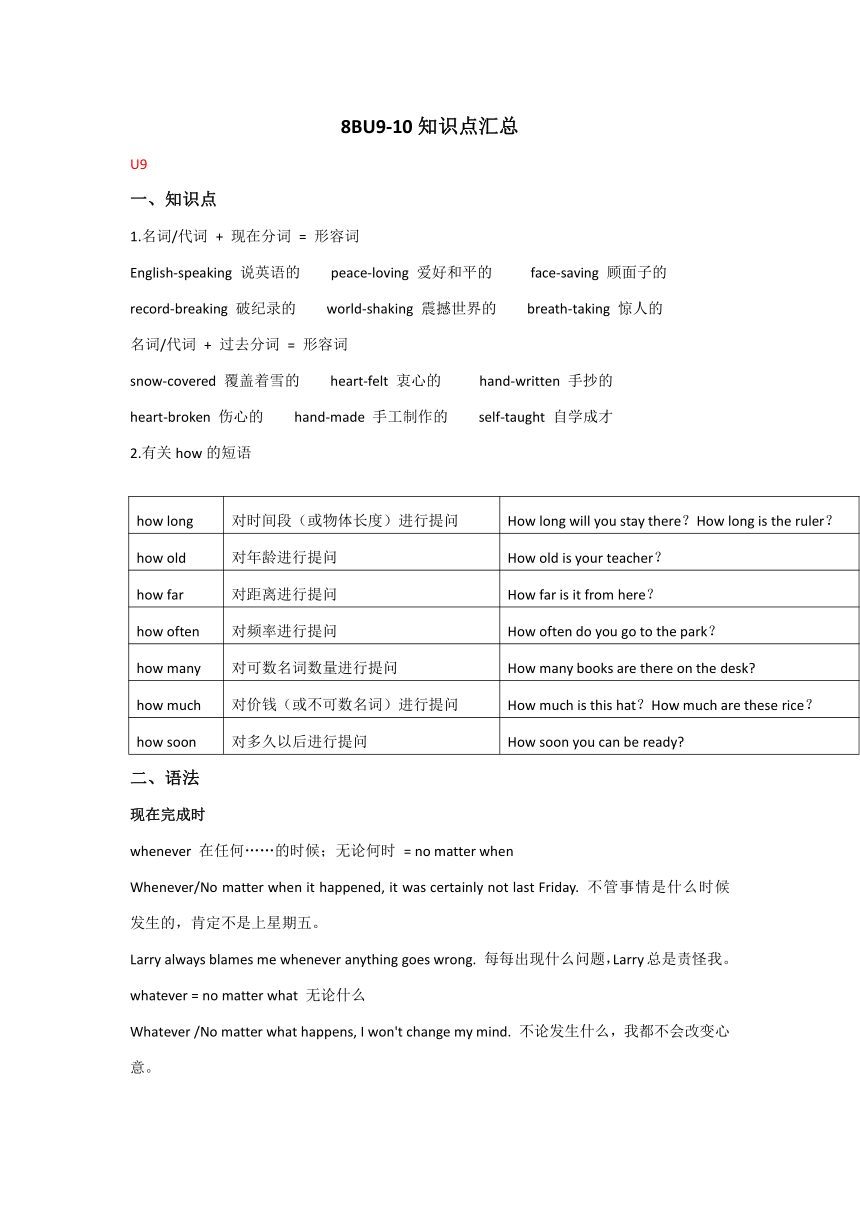 | |
| 格式 | docx | ||
| 文件大小 | 321.8KB | ||
| 资源类型 | 教案 | ||
| 版本资源 | 人教新目标(Go for it)版 | ||
| 科目 | 英语 | ||
| 更新时间 | 2024-05-14 07:22:32 | ||
图片预览

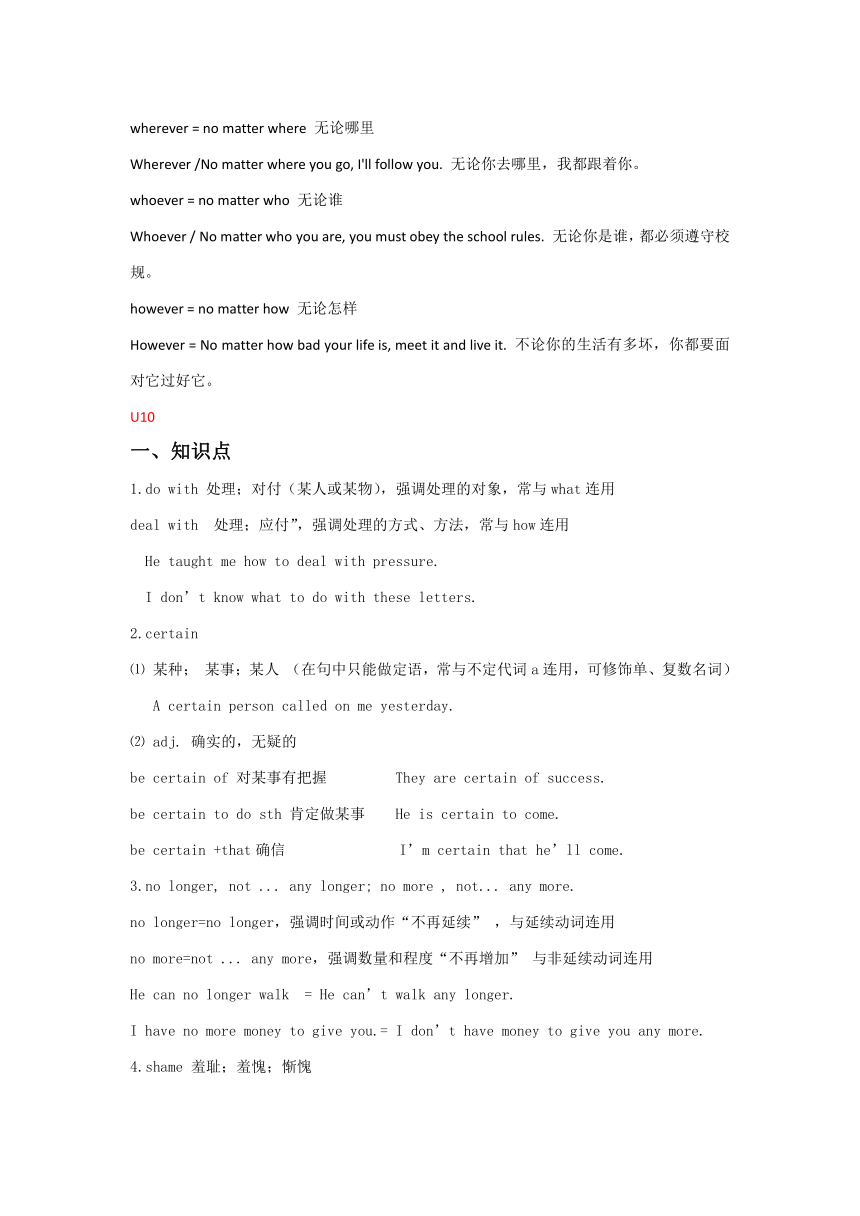
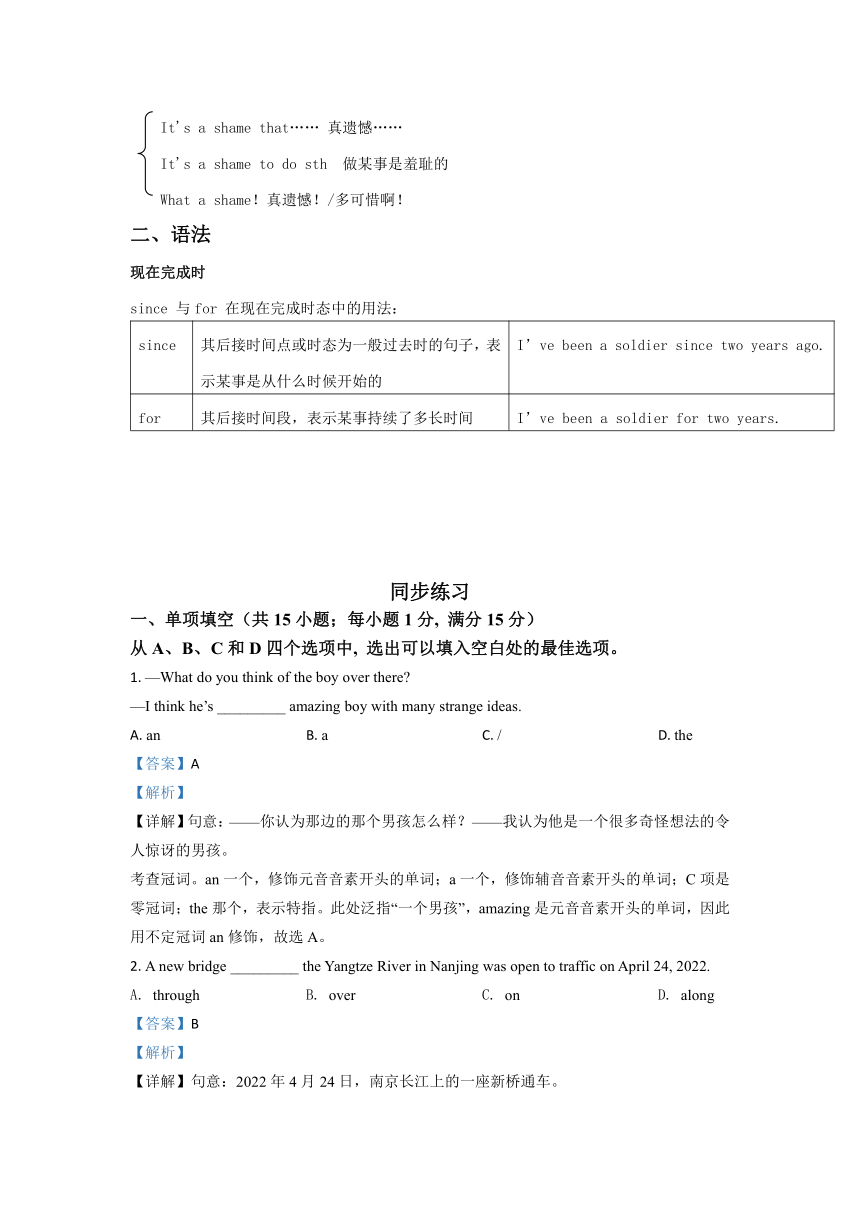
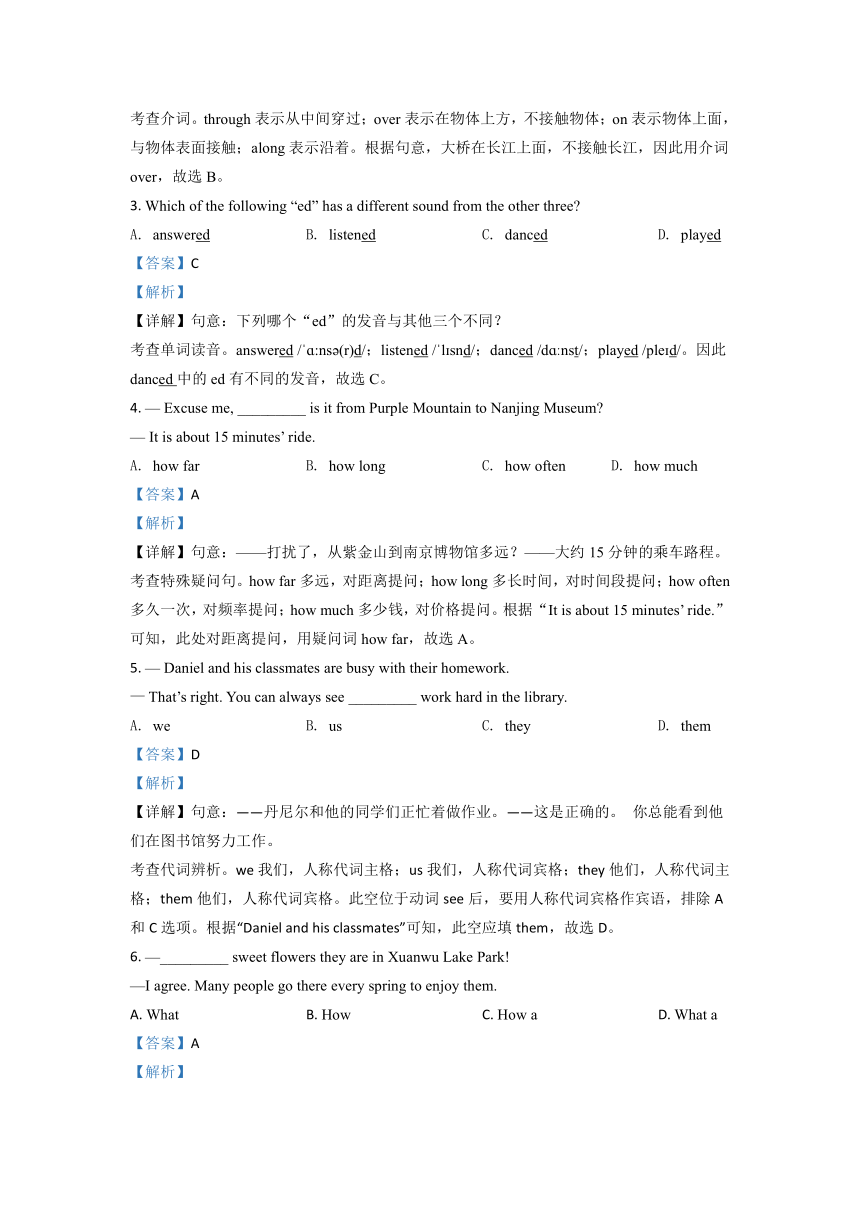
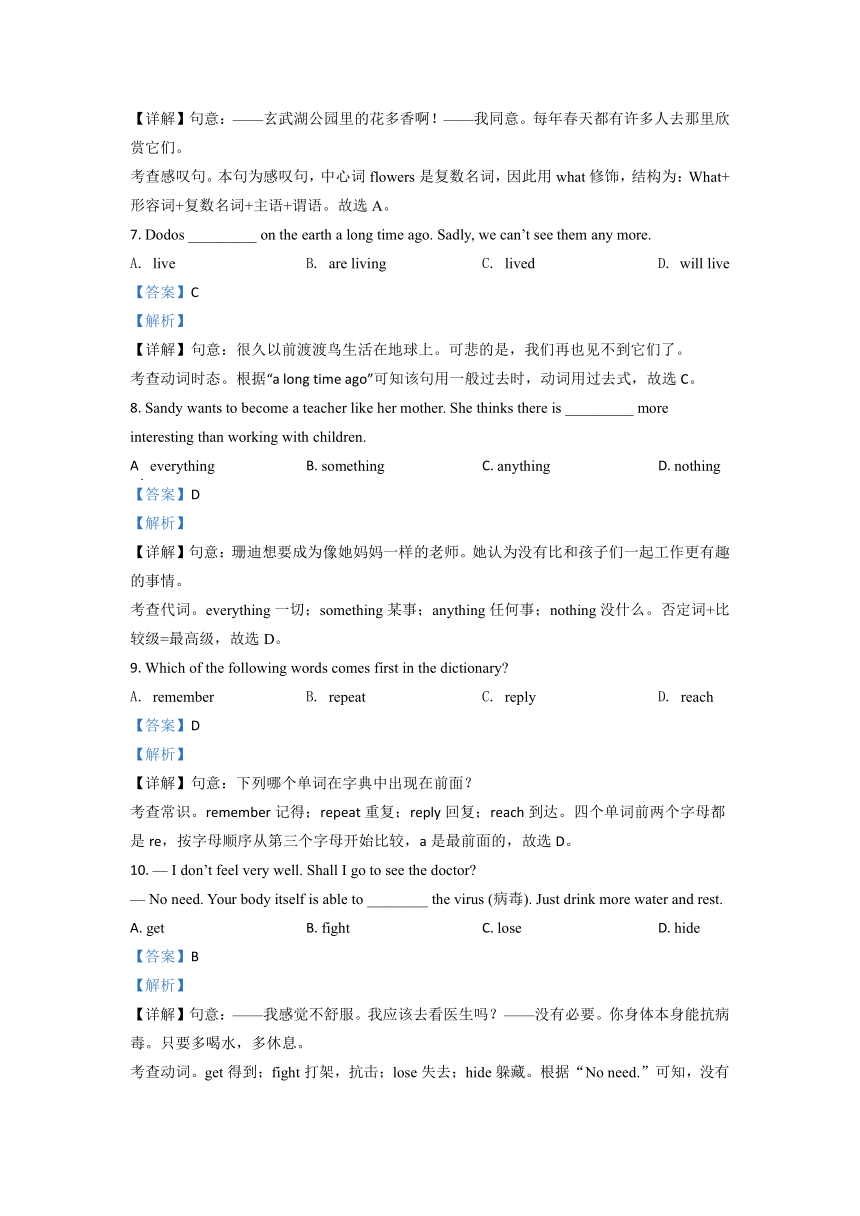
文档简介
8BU9-10知识点汇总
U9
一、知识点
1.名词/代词 + 现在分词 = 形容词
English-speaking 说英语的 peace-loving 爱好和平的 face-saving 顾面子的
record-breaking 破纪录的 world-shaking 震撼世界的 breath-taking 惊人的
名词/代词 + 过去分词 = 形容词
snow-covered 覆盖着雪的 heart-felt 衷心的 hand-written 手抄的
heart-broken 伤心的 hand-made 手工制作的 self-taught 自学成才
2.有关how的短语
how long 对时间段(或物体长度)进行提问 How long will you stay there?How long is the ruler?
how old 对年龄进行提问 How old is your teacher?
how far 对距离进行提问 How far is it from here?
how often 对频率进行提问 How often do you go to the park?
how many 对可数名词数量进行提问 How many books are there on the desk
how much 对价钱(或不可数名词)进行提问 How much is this hat?How much are these rice?
how soon 对多久以后进行提问 How soon you can be ready
二、语法
现在完成时
whenever 在任何……的时候;无论何时 = no matter when
Whenever/No matter when it happened, it was certainly not last Friday. 不管事情是什么时候发生的,肯定不是上星期五。
Larry always blames me whenever anything goes wrong. 每每出现什么问题,Larry总是责怪我。
whatever = no matter what 无论什么
Whatever /No matter what happens, I won't change my mind. 不论发生什么,我都不会改变心意。
wherever = no matter where 无论哪里
Wherever /No matter where you go, I'll follow you. 无论你去哪里,我都跟着你。
whoever = no matter who 无论谁
Whoever / No matter who you are, you must obey the school rules. 无论你是谁,都必须遵守校规。
however = no matter how 无论怎样
However = No matter how bad your life is, meet it and live it. 不论你的生活有多坏,你都要面对它过好它。
U10
一、知识点
1.do with 处理;对付(某人或某物),强调处理的对象,常与what连用
deal with 处理;应付”,强调处理的方式、方法,常与how连用
He taught me how to deal with pressure.
I don’t know what to do with these letters.
2.certain
⑴ 某种; 某事;某人 (在句中只能做定语,常与不定代词a连用,可修饰单、复数名词)
A certain person called on me yesterday.
⑵ adj. 确实的,无疑的
be certain of 对某事有把握 They are certain of success.
be certain to do sth 肯定做某事 He is certain to come.
be certain +that确信 I’m certain that he’ll come.
3.no longer, not ... any longer; no more , not... any more.
no longer=no longer,强调时间或动作“不再延续” ,与延续动词连用
no more=not ... any more,强调数量和程度“不再增加” 与非延续动词连用
He can no longer walk = He can’t walk any longer.
I have no more money to give you.= I don’t have money to give you any more.
4.shame 羞耻;羞愧;惭愧
It's a shame that…… 真遗憾……
It's a shame to do sth 做某事是羞耻的
What a shame!真遗憾!/多可惜啊!
二、语法
现在完成时
since 与for 在现在完成时态中的用法:
since 其后接时间点或时态为一般过去时的句子,表示某事是从什么时候开始的 I’ve been a soldier since two years ago.
for 其后接时间段,表示某事持续了多长时间 I’ve been a soldier for two years.
同步练习
一、单项填空(共15小题;每小题1分, 满分15分)
从A、B、C和D四个选项中, 选出可以填入空白处的最佳选项。
1. —What do you think of the boy over there
—I think he’s _________ amazing boy with many strange ideas.
A. an B. a C. / D. the
【答案】A
【解析】
【详解】句意:——你认为那边的那个男孩怎么样?——我认为他是一个很多奇怪想法的令人惊讶的男孩。
考查冠词。an一个,修饰元音音素开头的单词;a一个,修饰辅音音素开头的单词;C项是零冠词;the那个,表示特指。此处泛指“一个男孩”,amazing是元音音素开头的单词,因此用不定冠词an修饰,故选A。
2. A new bridge _________ the Yangtze River in Nanjing was open to traffic on April 24, 2022.
A. through B. over C. on D. along
【答案】B
【解析】
【详解】句意:2022年4月24日,南京长江上的一座新桥通车。
考查介词。through表示从中间穿过;over表示在物体上方,不接触物体;on表示物体上面,与物体表面接触;along表示沿着。根据句意,大桥在长江上面,不接触长江,因此用介词over,故选B。
3. Which of the following “ed” has a different sound from the other three
A. answered B. listened C. danced D. played
【答案】C
【解析】
【详解】句意:下列哪个“ed”的发音与其他三个不同?
考查单词读音。answered / ɑ:ns (r)d/;listened / l snd/;danced /dɑ nst/;played /ple d/。因此danced中的ed有不同的发音,故选C。
4. — Excuse me, _________ is it from Purple Mountain to Nanjing Museum
— It is about 15 minutes’ ride.
A. how far B. how long C. how often D. how much
【答案】A
【解析】
【详解】句意:——打扰了,从紫金山到南京博物馆多远?——大约15分钟的乘车路程。
考查特殊疑问句。how far多远,对距离提问;how long多长时间,对时间段提问;how often多久一次,对频率提问;how much多少钱,对价格提问。根据“It is about 15 minutes’ ride.”可知,此处对距离提问,用疑问词how far,故选A。
5. — Daniel and his classmates are busy with their homework.
— That’s right. You can always see _________ work hard in the library.
A. we B. us C. they D. them
【答案】D
【解析】
【详解】句意:——丹尼尔和他的同学们正忙着做作业。——这是正确的。 你总能看到他们在图书馆努力工作。
考查代词辨析。we我们,人称代词主格;us我们,人称代词宾格;they他们,人称代词主格;them他们,人称代词宾格。此空位于动词see后,要用人称代词宾格作宾语,排除A和C选项。根据“Daniel and his classmates”可知,此空应填them,故选D。
6. —_________ sweet flowers they are in Xuanwu Lake Park!
—I agree. Many people go there every spring to enjoy them.
A. What B. How C. How a D. What a
【答案】A
【解析】
【详解】句意:——玄武湖公园里的花多香啊!——我同意。每年春天都有许多人去那里欣赏它们。
考查感叹句。本句为感叹句,中心词flowers是复数名词,因此用what修饰,结构为:What+形容词+复数名词+主语+谓语。故选A。
7. Dodos _________ on the earth a long time ago. Sadly, we can’t see them any more.
A. live B. are living C. lived D. will live
【答案】C
【解析】
【详解】句意:很久以前渡渡鸟生活在地球上。可悲的是,我们再也见不到它们了。
考查动词时态。根据“a long time ago”可知该句用一般过去时,动词用过去式,故选C。
8. Sandy wants to become a teacher like her mother. She thinks there is _________ more interesting than working with children.
A everything B. something C. anything D. nothing
【答案】D
【解析】
【详解】句意:珊迪想要成为像她妈妈一样的老师。她认为没有比和孩子们一起工作更有趣的事情。
考查代词。everything一切;something某事;anything任何事;nothing没什么。否定词+比较级=最高级,故选D。
9. Which of the following words comes first in the dictionary
A. remember B. repeat C. reply D. reach
【答案】D
【解析】
【详解】句意:下列哪个单词在字典中出现在前面?
考查常识。remember记得;repeat重复;reply回复;reach到达。四个单词前两个字母都是re,按字母顺序从第三个字母开始比较,a是最前面的,故选D。
10. — I don’t feel very well. Shall I go to see the doctor
— No need. Your body itself is able to ________ the virus (病毒). Just drink more water and rest.
A. get B. fight C. lose D. hide
【答案】B
【解析】
【详解】句意:——我感觉不舒服。我应该去看医生吗?——没有必要。你身体本身能抗病毒。只要多喝水,多休息。
考查动词。get得到;fight打架,抗击;lose失去;hide躲藏。根据“No need.”可知,没有必要去看医生,因此表示身体本身能与病毒作斗争,故选B。
11. —Could you _________ a tent alone when you were ten years old
—No, I couldn’t. It was not easy for me at that time.
A. put on B. put up C. put out D. put down
【答案】B
【解析】
【详解】句意:——十岁的时候,你能一个人搭帐篷吗?——不,我不能。那个时候对我来说是不容易的。
考查动词短语。put on上演;put up搭建;put out扑灭;put down放下。根据“a tent”可知是搭建帐篷。故选B。
12. —The brown jacket is nice, _________it doesn’t look good on me.
—Why not try on the blue one
A. and B. so C. but D. or
【答案】C
【解析】
【详解】句意:——那件棕色夹克不错,但我穿不好看。——为什么不试试那件蓝色的呢?
考查连词辨析。and和;so所以;but但是;or或者。根据“it doesn’t look good on me”可知前后两句是转折关系,因此but符合句意;故选C。
13. —The International Space Station is now open to visitors.
—But people have to _________ about $35, 000 for the special trip.
A. take B. cost C. use D. pay
【答案】D
【解析】
【详解】句意:——国际空间站现在对游客开放。——但人们必须为这次特殊的旅行支付大约3.5万美元。
考查动词辨析。take花费(搭配it使用),乘坐;cost花费(物作主语);use使用;pay支付,构成短语pay money for sth.“为某物支付钱”。根据“about $35, 000 for”可知,考查固定搭配“pay money for sth.”,故选D。
14. If you use a kitchen _________, you will understand the best way to design it.
A. from then on B. all the time C. at that moment D. the other day
【答案】B
【解析】
【详解】句意:如果你一直使用厨房,你将了解设计它的最佳方式。
考查介词短语。from then on从那时起;all the time一直;at that moment在那时;the other day改天,根据“you will understand the best way to design it”可知,此处指一直使用厨房,故选B。
15. —Mum, I don’t have anybody to play with. Can I have a pet
—_________ Our flat is too small.
A. Why not B. Anything else C. I hope so. D. I’m afraid not.
【答案】D
【解析】
【详解】句意:——妈妈,我没有人可以一起玩。我可以养宠物吗?——恐怕不行。我们的公寓太小了。
考查情景交际。Why not为什么不呢;Anything else还有别的吗;I hope so希望如此;I’m afraid not恐怕不行。根据“Our flat is too small.”可知,公寓太小了,所以不能养宠物,应委婉地拒绝, I’m afraid not符合语境。故选D。
二、完形填空(共10小题;每小题1分,满分10分)阅读下面短文,从各题所给的A、B、C和D四个选项中,选出可以填入空白处的最佳选项。
Frank was a very talkative little boy. Whenever he saw a new thing, he asked a great many questions about it. His mother was very___16___. When there was time to answer his questions, she would do so.
The first time Frank saw an hourglass (沙漏), he was very ___17___, but he did not know what it was. His mother said, “An hourglass is made in the shape of the figure 8. The sand is put in at one end and runs through a small hole in the ___18___. As much sand is put into the glass as will run through in an hour…”
Frank watched the little stream of sand. He was very impatient, ___19___ it would not run faster. “Let me ___20___ it, Mother,” said he. “It is lazy, and will never get through.”
“Oh yes, it ___21___, my son,” said his mother. “The sand moves by little and little, but it moves all the time…”
“At night, the ___22___ in the hourglass has run through twelve times. When you look at the hands of the clock, you think they go very ___23___, and so they do, but they never stop. The hour hand of the clock has moved all around its great face. This is because the hands of the clock ___24___ working every minute. They do not stop to think how much they have to do, and ___25___ it will take them to do it.”
Frank seemed to understand something.
16. A. patient B. polite C. honest D. humorous
17. A. sad B. ready C. bored D. curious
18. A. end B. glass C. middle D. beginning
19. A. and B. so C. or D. because
20. A. shake B. repair C. mix D. pull
21. A. must B. can’t C. won’t D. will
22. A. air B. sand C. clock D. hand
23. A. quickly B. easily C. slowly D. quietly
24. A. keep B. forget C. stop D. dislike
25. A. how often B. how many C. how much D. how long
【答案】16. A 17. D 18. C 19. D 20. A 21. D 22. B 23. C 24. A 25. D
【解析】
【导语】本文是一篇记叙文,文中Frank是一个爱问问题的孩子。有一次,他看见沙漏,很好奇,但是觉得沙子漏的太慢。妈妈耐心的解释让他明白:很多事情无论做起来要花多长时间,只要坚持一直做下去就能成功。
【16题详解】
句意:他的母亲很有耐心。
patient耐心的;polite礼貌的;honest诚实的;humorous幽默的。根据“When there was time to answer his questions, she would do so.”可知,只要有时间,妈妈就会回答儿子的问题,因此她是耐心的。故选A。
【17题详解】
句意:Frank第一次看到沙漏时,他很好奇,但不知道它是什么。
sad悲伤的;ready准备好的;bored无聊的;curious好奇的。根据“The first time Frank saw an hourglass”以及后文他与妈妈的对话可知,Frank第一次看见沙漏,应该是好奇的。故选D。
【18题详解】
句意:沙子被放在一端,穿过中间的一个小孔。
end末尾;glass玻璃;middle中间;beginning开始。根据“a small hole in the ...”以及常识可知,小孔在沙漏的中间。故选C。
【19题详解】
句意:他很不耐烦,因为它流得不快。
and并且;so所以;or或者,否则;because因为。根据“He was very impatient...it would not run faster.”可知,他不耐烦是因为沙漏里的沙子流得太慢了,后半句是原因,因此用because引导原因状语从句。故选D。
【20题详解】
句意:让我摇一摇它,妈妈。
shake摇晃;repair修理;mix混合;pull拉。根据“He was very impatient...it would not run faster.”可知,Frank觉得沙漏流得太慢了,因此想摇一摇。故选A。
【21题详解】
句意:它会的,我的孩子。
must必须;can’t不会;won’t将不会;will将。根据Frank的话“It is lazy, and will never get through.”以及妈妈的回答“The sand moves by little and little, but it moves all the time.”可知,Frank认为沙漏里的沙子永远不能都穿过去,妈妈向他解释,通过一点一点不断地流动,沙子会都穿过去的,用will。故选D。
【22题详解】
句意:在夜晚,沙漏里的沙子已经穿过小孔十二次了。
air空气;sand沙子;clock钟表;hand手。根据“...in the hourglass has run through twelve times.”可知,此处指沙漏里的沙子。故选B。
【23题详解】
句意:当你看钟表的指针时,你会觉得它们走得很慢,确实如此,但它们从未停止过。
quickly快地;easily容易地;slowly慢地;quietly安静地。根据“When you look at the hands of the clock”以及常识可知,钟表的指针走得很慢。故选C。
【24题详解】
句意:这是因为钟的指针每分钟都在工作。
keep保持,一直;forget忘记;stop停止;dislike不喜欢。根据“They do not stop”可知,钟表的指针从不停止,一直工作。故选A。
【25题详解】
句意:它们不会停下来思考需要做多少,以及需要花多长时间去做。
how often多久一次;how many多少;how much多少(钱);how long多久。根据“...it will take them to do it”可知,此处表示花费多长时间。故选D。
三、阅读理解
A
(参考词汇:sting v. 叮,刺,蛰; skin n. 皮肤; bump n. 肿块,隆起)
26. What will be in your skin if a bee stings you
A. Stinger. B. Poison. C. Red bump. D. Nothing.
27. What does “poison” mean in the text
A. 蜂蜜 B. 有害的食物 C. 毒液 D. 酒
28. Which of the following is NOT correct if you see a bear
A. Turn around. B. Walk away quickly. C. Don’t run. D. Don’t be scared.
29. The above must be________ safety (安全) tips.
A. shopping B. swimming C. camping D. driving
【答案】26. A 27. C 28. B 29. C
【解析】
【导语】本文讲述了被蜜蜂蛰了以及看见熊该怎么做。
【26题详解】
细节理解题。根据第一则材料的第一句“If a bee stings you, the stinger will be in your skin.”可知若被蜜蜂蛰了,刺会留在皮肤里。故选A。
【27题详解】
词义猜测题。根据下文“There will be a red bump on your skin.”可知,蜜蜂的刺留在皮肤里会导致皮肤发红起包,可推断出蜜蜂的刺有毒,所以这里“poison”可以理解为“毒液”。故选C。
【28题详解】
细节理解题。根据第二则材料前三句可知,如果遇到熊,不要害怕,转过身慢慢走开,不要跑,所以选项B说法错误。故选B。
【29题详解】
推理判断题。两则材料主要讲述了被蜜蜂蛰了以及看见熊该怎么做,可推断出这些情况多半发生在外出野营时。故选C。
U9
一、知识点
1.名词/代词 + 现在分词 = 形容词
English-speaking 说英语的 peace-loving 爱好和平的 face-saving 顾面子的
record-breaking 破纪录的 world-shaking 震撼世界的 breath-taking 惊人的
名词/代词 + 过去分词 = 形容词
snow-covered 覆盖着雪的 heart-felt 衷心的 hand-written 手抄的
heart-broken 伤心的 hand-made 手工制作的 self-taught 自学成才
2.有关how的短语
how long 对时间段(或物体长度)进行提问 How long will you stay there?How long is the ruler?
how old 对年龄进行提问 How old is your teacher?
how far 对距离进行提问 How far is it from here?
how often 对频率进行提问 How often do you go to the park?
how many 对可数名词数量进行提问 How many books are there on the desk
how much 对价钱(或不可数名词)进行提问 How much is this hat?How much are these rice?
how soon 对多久以后进行提问 How soon you can be ready
二、语法
现在完成时
whenever 在任何……的时候;无论何时 = no matter when
Whenever/No matter when it happened, it was certainly not last Friday. 不管事情是什么时候发生的,肯定不是上星期五。
Larry always blames me whenever anything goes wrong. 每每出现什么问题,Larry总是责怪我。
whatever = no matter what 无论什么
Whatever /No matter what happens, I won't change my mind. 不论发生什么,我都不会改变心意。
wherever = no matter where 无论哪里
Wherever /No matter where you go, I'll follow you. 无论你去哪里,我都跟着你。
whoever = no matter who 无论谁
Whoever / No matter who you are, you must obey the school rules. 无论你是谁,都必须遵守校规。
however = no matter how 无论怎样
However = No matter how bad your life is, meet it and live it. 不论你的生活有多坏,你都要面对它过好它。
U10
一、知识点
1.do with 处理;对付(某人或某物),强调处理的对象,常与what连用
deal with 处理;应付”,强调处理的方式、方法,常与how连用
He taught me how to deal with pressure.
I don’t know what to do with these letters.
2.certain
⑴ 某种; 某事;某人 (在句中只能做定语,常与不定代词a连用,可修饰单、复数名词)
A certain person called on me yesterday.
⑵ adj. 确实的,无疑的
be certain of 对某事有把握 They are certain of success.
be certain to do sth 肯定做某事 He is certain to come.
be certain +that确信 I’m certain that he’ll come.
3.no longer, not ... any longer; no more , not... any more.
no longer=no longer,强调时间或动作“不再延续” ,与延续动词连用
no more=not ... any more,强调数量和程度“不再增加” 与非延续动词连用
He can no longer walk = He can’t walk any longer.
I have no more money to give you.= I don’t have money to give you any more.
4.shame 羞耻;羞愧;惭愧
It's a shame that…… 真遗憾……
It's a shame to do sth 做某事是羞耻的
What a shame!真遗憾!/多可惜啊!
二、语法
现在完成时
since 与for 在现在完成时态中的用法:
since 其后接时间点或时态为一般过去时的句子,表示某事是从什么时候开始的 I’ve been a soldier since two years ago.
for 其后接时间段,表示某事持续了多长时间 I’ve been a soldier for two years.
同步练习
一、单项填空(共15小题;每小题1分, 满分15分)
从A、B、C和D四个选项中, 选出可以填入空白处的最佳选项。
1. —What do you think of the boy over there
—I think he’s _________ amazing boy with many strange ideas.
A. an B. a C. / D. the
【答案】A
【解析】
【详解】句意:——你认为那边的那个男孩怎么样?——我认为他是一个很多奇怪想法的令人惊讶的男孩。
考查冠词。an一个,修饰元音音素开头的单词;a一个,修饰辅音音素开头的单词;C项是零冠词;the那个,表示特指。此处泛指“一个男孩”,amazing是元音音素开头的单词,因此用不定冠词an修饰,故选A。
2. A new bridge _________ the Yangtze River in Nanjing was open to traffic on April 24, 2022.
A. through B. over C. on D. along
【答案】B
【解析】
【详解】句意:2022年4月24日,南京长江上的一座新桥通车。
考查介词。through表示从中间穿过;over表示在物体上方,不接触物体;on表示物体上面,与物体表面接触;along表示沿着。根据句意,大桥在长江上面,不接触长江,因此用介词over,故选B。
3. Which of the following “ed” has a different sound from the other three
A. answered B. listened C. danced D. played
【答案】C
【解析】
【详解】句意:下列哪个“ed”的发音与其他三个不同?
考查单词读音。answered / ɑ:ns (r)d/;listened / l snd/;danced /dɑ nst/;played /ple d/。因此danced中的ed有不同的发音,故选C。
4. — Excuse me, _________ is it from Purple Mountain to Nanjing Museum
— It is about 15 minutes’ ride.
A. how far B. how long C. how often D. how much
【答案】A
【解析】
【详解】句意:——打扰了,从紫金山到南京博物馆多远?——大约15分钟的乘车路程。
考查特殊疑问句。how far多远,对距离提问;how long多长时间,对时间段提问;how often多久一次,对频率提问;how much多少钱,对价格提问。根据“It is about 15 minutes’ ride.”可知,此处对距离提问,用疑问词how far,故选A。
5. — Daniel and his classmates are busy with their homework.
— That’s right. You can always see _________ work hard in the library.
A. we B. us C. they D. them
【答案】D
【解析】
【详解】句意:——丹尼尔和他的同学们正忙着做作业。——这是正确的。 你总能看到他们在图书馆努力工作。
考查代词辨析。we我们,人称代词主格;us我们,人称代词宾格;they他们,人称代词主格;them他们,人称代词宾格。此空位于动词see后,要用人称代词宾格作宾语,排除A和C选项。根据“Daniel and his classmates”可知,此空应填them,故选D。
6. —_________ sweet flowers they are in Xuanwu Lake Park!
—I agree. Many people go there every spring to enjoy them.
A. What B. How C. How a D. What a
【答案】A
【解析】
【详解】句意:——玄武湖公园里的花多香啊!——我同意。每年春天都有许多人去那里欣赏它们。
考查感叹句。本句为感叹句,中心词flowers是复数名词,因此用what修饰,结构为:What+形容词+复数名词+主语+谓语。故选A。
7. Dodos _________ on the earth a long time ago. Sadly, we can’t see them any more.
A. live B. are living C. lived D. will live
【答案】C
【解析】
【详解】句意:很久以前渡渡鸟生活在地球上。可悲的是,我们再也见不到它们了。
考查动词时态。根据“a long time ago”可知该句用一般过去时,动词用过去式,故选C。
8. Sandy wants to become a teacher like her mother. She thinks there is _________ more interesting than working with children.
A everything B. something C. anything D. nothing
【答案】D
【解析】
【详解】句意:珊迪想要成为像她妈妈一样的老师。她认为没有比和孩子们一起工作更有趣的事情。
考查代词。everything一切;something某事;anything任何事;nothing没什么。否定词+比较级=最高级,故选D。
9. Which of the following words comes first in the dictionary
A. remember B. repeat C. reply D. reach
【答案】D
【解析】
【详解】句意:下列哪个单词在字典中出现在前面?
考查常识。remember记得;repeat重复;reply回复;reach到达。四个单词前两个字母都是re,按字母顺序从第三个字母开始比较,a是最前面的,故选D。
10. — I don’t feel very well. Shall I go to see the doctor
— No need. Your body itself is able to ________ the virus (病毒). Just drink more water and rest.
A. get B. fight C. lose D. hide
【答案】B
【解析】
【详解】句意:——我感觉不舒服。我应该去看医生吗?——没有必要。你身体本身能抗病毒。只要多喝水,多休息。
考查动词。get得到;fight打架,抗击;lose失去;hide躲藏。根据“No need.”可知,没有必要去看医生,因此表示身体本身能与病毒作斗争,故选B。
11. —Could you _________ a tent alone when you were ten years old
—No, I couldn’t. It was not easy for me at that time.
A. put on B. put up C. put out D. put down
【答案】B
【解析】
【详解】句意:——十岁的时候,你能一个人搭帐篷吗?——不,我不能。那个时候对我来说是不容易的。
考查动词短语。put on上演;put up搭建;put out扑灭;put down放下。根据“a tent”可知是搭建帐篷。故选B。
12. —The brown jacket is nice, _________it doesn’t look good on me.
—Why not try on the blue one
A. and B. so C. but D. or
【答案】C
【解析】
【详解】句意:——那件棕色夹克不错,但我穿不好看。——为什么不试试那件蓝色的呢?
考查连词辨析。and和;so所以;but但是;or或者。根据“it doesn’t look good on me”可知前后两句是转折关系,因此but符合句意;故选C。
13. —The International Space Station is now open to visitors.
—But people have to _________ about $35, 000 for the special trip.
A. take B. cost C. use D. pay
【答案】D
【解析】
【详解】句意:——国际空间站现在对游客开放。——但人们必须为这次特殊的旅行支付大约3.5万美元。
考查动词辨析。take花费(搭配it使用),乘坐;cost花费(物作主语);use使用;pay支付,构成短语pay money for sth.“为某物支付钱”。根据“about $35, 000 for”可知,考查固定搭配“pay money for sth.”,故选D。
14. If you use a kitchen _________, you will understand the best way to design it.
A. from then on B. all the time C. at that moment D. the other day
【答案】B
【解析】
【详解】句意:如果你一直使用厨房,你将了解设计它的最佳方式。
考查介词短语。from then on从那时起;all the time一直;at that moment在那时;the other day改天,根据“you will understand the best way to design it”可知,此处指一直使用厨房,故选B。
15. —Mum, I don’t have anybody to play with. Can I have a pet
—_________ Our flat is too small.
A. Why not B. Anything else C. I hope so. D. I’m afraid not.
【答案】D
【解析】
【详解】句意:——妈妈,我没有人可以一起玩。我可以养宠物吗?——恐怕不行。我们的公寓太小了。
考查情景交际。Why not为什么不呢;Anything else还有别的吗;I hope so希望如此;I’m afraid not恐怕不行。根据“Our flat is too small.”可知,公寓太小了,所以不能养宠物,应委婉地拒绝, I’m afraid not符合语境。故选D。
二、完形填空(共10小题;每小题1分,满分10分)阅读下面短文,从各题所给的A、B、C和D四个选项中,选出可以填入空白处的最佳选项。
Frank was a very talkative little boy. Whenever he saw a new thing, he asked a great many questions about it. His mother was very___16___. When there was time to answer his questions, she would do so.
The first time Frank saw an hourglass (沙漏), he was very ___17___, but he did not know what it was. His mother said, “An hourglass is made in the shape of the figure 8. The sand is put in at one end and runs through a small hole in the ___18___. As much sand is put into the glass as will run through in an hour…”
Frank watched the little stream of sand. He was very impatient, ___19___ it would not run faster. “Let me ___20___ it, Mother,” said he. “It is lazy, and will never get through.”
“Oh yes, it ___21___, my son,” said his mother. “The sand moves by little and little, but it moves all the time…”
“At night, the ___22___ in the hourglass has run through twelve times. When you look at the hands of the clock, you think they go very ___23___, and so they do, but they never stop. The hour hand of the clock has moved all around its great face. This is because the hands of the clock ___24___ working every minute. They do not stop to think how much they have to do, and ___25___ it will take them to do it.”
Frank seemed to understand something.
16. A. patient B. polite C. honest D. humorous
17. A. sad B. ready C. bored D. curious
18. A. end B. glass C. middle D. beginning
19. A. and B. so C. or D. because
20. A. shake B. repair C. mix D. pull
21. A. must B. can’t C. won’t D. will
22. A. air B. sand C. clock D. hand
23. A. quickly B. easily C. slowly D. quietly
24. A. keep B. forget C. stop D. dislike
25. A. how often B. how many C. how much D. how long
【答案】16. A 17. D 18. C 19. D 20. A 21. D 22. B 23. C 24. A 25. D
【解析】
【导语】本文是一篇记叙文,文中Frank是一个爱问问题的孩子。有一次,他看见沙漏,很好奇,但是觉得沙子漏的太慢。妈妈耐心的解释让他明白:很多事情无论做起来要花多长时间,只要坚持一直做下去就能成功。
【16题详解】
句意:他的母亲很有耐心。
patient耐心的;polite礼貌的;honest诚实的;humorous幽默的。根据“When there was time to answer his questions, she would do so.”可知,只要有时间,妈妈就会回答儿子的问题,因此她是耐心的。故选A。
【17题详解】
句意:Frank第一次看到沙漏时,他很好奇,但不知道它是什么。
sad悲伤的;ready准备好的;bored无聊的;curious好奇的。根据“The first time Frank saw an hourglass”以及后文他与妈妈的对话可知,Frank第一次看见沙漏,应该是好奇的。故选D。
【18题详解】
句意:沙子被放在一端,穿过中间的一个小孔。
end末尾;glass玻璃;middle中间;beginning开始。根据“a small hole in the ...”以及常识可知,小孔在沙漏的中间。故选C。
【19题详解】
句意:他很不耐烦,因为它流得不快。
and并且;so所以;or或者,否则;because因为。根据“He was very impatient...it would not run faster.”可知,他不耐烦是因为沙漏里的沙子流得太慢了,后半句是原因,因此用because引导原因状语从句。故选D。
【20题详解】
句意:让我摇一摇它,妈妈。
shake摇晃;repair修理;mix混合;pull拉。根据“He was very impatient...it would not run faster.”可知,Frank觉得沙漏流得太慢了,因此想摇一摇。故选A。
【21题详解】
句意:它会的,我的孩子。
must必须;can’t不会;won’t将不会;will将。根据Frank的话“It is lazy, and will never get through.”以及妈妈的回答“The sand moves by little and little, but it moves all the time.”可知,Frank认为沙漏里的沙子永远不能都穿过去,妈妈向他解释,通过一点一点不断地流动,沙子会都穿过去的,用will。故选D。
【22题详解】
句意:在夜晚,沙漏里的沙子已经穿过小孔十二次了。
air空气;sand沙子;clock钟表;hand手。根据“...in the hourglass has run through twelve times.”可知,此处指沙漏里的沙子。故选B。
【23题详解】
句意:当你看钟表的指针时,你会觉得它们走得很慢,确实如此,但它们从未停止过。
quickly快地;easily容易地;slowly慢地;quietly安静地。根据“When you look at the hands of the clock”以及常识可知,钟表的指针走得很慢。故选C。
【24题详解】
句意:这是因为钟的指针每分钟都在工作。
keep保持,一直;forget忘记;stop停止;dislike不喜欢。根据“They do not stop”可知,钟表的指针从不停止,一直工作。故选A。
【25题详解】
句意:它们不会停下来思考需要做多少,以及需要花多长时间去做。
how often多久一次;how many多少;how much多少(钱);how long多久。根据“...it will take them to do it”可知,此处表示花费多长时间。故选D。
三、阅读理解
A
(参考词汇:sting v. 叮,刺,蛰; skin n. 皮肤; bump n. 肿块,隆起)
26. What will be in your skin if a bee stings you
A. Stinger. B. Poison. C. Red bump. D. Nothing.
27. What does “poison” mean in the text
A. 蜂蜜 B. 有害的食物 C. 毒液 D. 酒
28. Which of the following is NOT correct if you see a bear
A. Turn around. B. Walk away quickly. C. Don’t run. D. Don’t be scared.
29. The above must be________ safety (安全) tips.
A. shopping B. swimming C. camping D. driving
【答案】26. A 27. C 28. B 29. C
【解析】
【导语】本文讲述了被蜜蜂蛰了以及看见熊该怎么做。
【26题详解】
细节理解题。根据第一则材料的第一句“If a bee stings you, the stinger will be in your skin.”可知若被蜜蜂蛰了,刺会留在皮肤里。故选A。
【27题详解】
词义猜测题。根据下文“There will be a red bump on your skin.”可知,蜜蜂的刺留在皮肤里会导致皮肤发红起包,可推断出蜜蜂的刺有毒,所以这里“poison”可以理解为“毒液”。故选C。
【28题详解】
细节理解题。根据第二则材料前三句可知,如果遇到熊,不要害怕,转过身慢慢走开,不要跑,所以选项B说法错误。故选B。
【29题详解】
推理判断题。两则材料主要讲述了被蜜蜂蛰了以及看见熊该怎么做,可推断出这些情况多半发生在外出野营时。故选C。
同课章节目录
- Unit 1 What's the matter?
- Section A
- Section B
- Unit 2 I'll help to clean up the city parks.
- Section A
- Section B
- Unit 3 Could you please clean your room?
- Section A
- Section B
- Unit 4 Why don't you talk to your parents?
- Section A
- Section B
- Unit 5 What were you doing when the rainstorm came
- Section A
- Section B
- Review of Units 1-5
- Unit 6 An old man tried to move the mountains.
- Section A
- Section B
- Unit 7 What's the highest mountain in the world?
- Section A
- Section B
- Unit 8 Have you read Treasure Island yet?
- Section A
- Section B
- Unit 9 Have you ever been to a museum?
- Section A
- Section B
- Unit 10 I've had this bike for three years.
- Section A
- Section B
